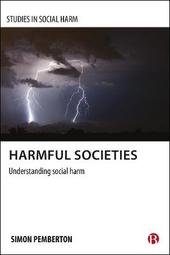
|
Harmful Societies: Understanding Social Harm
Paperback / softback
Main Details
| Title |
Harmful Societies: Understanding Social Harm
|
| Authors and Contributors |
By (author) Simon A. Pemberton
|
| Series | Studies in Social Harm |
|---|
| Physical Properties |
| Format:Paperback / softback | | Pages:224 | | Dimensions(mm): Height 234,Width 156 |
|
| ISBN/Barcode |
9781847427953
|
| Classifications | Dewey:364.01 |
|---|
| Audience | | Professional & Vocational | | General | |
|---|
| Illustrations |
No
|
|
Publishing Details |
| Publisher |
Policy Press
|
| Imprint |
Policy Press
|
| Publication Date |
23 March 2016 |
| Publication Country |
United Kingdom
|
Description
While the notion of social harm has long interested critical criminologists it is now being explored as an alternative field of study, which provides more accurate analyses of the vicissitudes of life. However, important aspects of this notion remain undeveloped, in particular the definition of social harm, the question of responsibility and the methodologies for studying harm. This book, the first to theorise and define the social harm concept beyond criminology, seeks to address these omissions and questions why some capitalist societies appear to be more harmful than others. In doing so it provides a platform for future debates, in this series and beyond. It will be a valuable resource for academics and researchers across criminology, sociology, social policy, socio-legal studies and geography.
Author Biography
Simon Pemberton is a Birmingham Fellow jointly appointed to the Schools of Law and Social Policy at the University of Birmingham. He has researched and published widely in the areas of corporate and state harm, poverty and inequality, crime, social harm and criminalisation.
Reviews"Simon Pemberton's groundbreaking volume provides a major step forward in understanding the causation and alleviation of widespread harm." Danny Dorling, University of Oxford "In a sense, criminology has been `waiting' for this original and highly topical book. It is of theoretical, conceptual, methodological and empirical significance, making novel contributions in each respect." Steve Tombs, The Open University
|